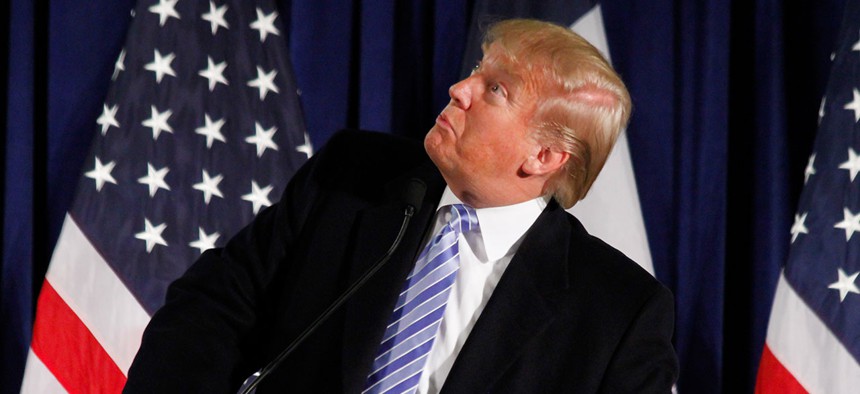
Flickr user Max Goldberg
What If Trump Got Hacked Too?
A news report suggests that agents linked to the Russian state may have tried to break into the computer systems of the Republican Party and its presidential nominee.
The story seemed so neatly self-contained: Someone hacked the Democratic National Convention. Those hackers were connected to the Russian government, according to U.S. intelligence and outside experts alike. And then someone leaked a tranche of DNC emails just as the Democrats were gathering for their convention in Philadelphia—an optimally damaging time. It didn’t take Holmesian deduction why some people concluded that Russian agents were trying to influence the election by hurting Hillary Clinton. A spree of comments from Donald Trump praising Vladimir Putin, waving off the annexation of Crimea, and semi-jokingly calling for Russia to release Hillary Clinton’s State Department emails only made it all look fishier.
But what if Trump’s campaign was hacked, too? Reuters reports Friday:
Hackers targeted the computer systems of presidential candidate Donald Trump and Republican Party organizations as well as Democratic Party networks, sources familiar with investigations into the attacks said. At least one Trump staff member’s email account was infected with malware in 2015 and sent malicious emails to colleagues, according to one insider for the Republican candidate's campaign and an outside security expert. It was unclear whether or not the hackers actually gained access to campaign computers.
Sources told Reuters that the attack on Trump campaign and RNC computers resembled the one against the Democrats, and the Republicans have even hired the same security firm, CrowdStrike, to investigate.
So far, Reuters is the only outlet with the story, but if it’s right, it would put the entire existing narrative in question. On the one hand, Russian hacking targeted at the RNC and Trump team would reinforce the worrying idea that a foreign government is trying to meddle in the American election. But it would make the motives a little more obscure. It’s not altogether surprising that someone would want to snoop on both parties.
In an interview with Slate in July, Glenn Greenwald took issue with journalists speculating on ties between Trump and Putin:
The history of linking your political opponents to Russia is a really dangerous and ugly one in the U.S. That’s basically how, for a decade, the right demonized the left, but also liberals. This is the rhetoric that has been resurrected in order to demonize Trump, and I do find it disturbing because, what has he said about Russia? The platform change that he wanted said that he didn’t think the U.S. should be funding factions in the Ukraine in order to defend themselves against Russia because he didn’t think we had a vital interest in Russia’s neighborhood. Let’s leave that to them. You can argue with that and say it’s an irresponsible thing to do. But that’s been a standard liberal view for decades.
That’s a somewhat incomplete gloss on the situation: The change in the Republican platform to which Greenwald alludes was hardly the only incident, and Trump’s suggestion that the U.S. might recognize the Crimean takeover is hardly a “standard liberal view” except perhaps in the pages of The Nation. Nonetheless, evidence of hacking on both parties might give the press pause, and grant some credence to Greenwald’s suggestion that the press was too quick to validate the idea of a Russian hit on the Democratic Party.
All that said, bipartisan hacking doesn’t preclude Kremlin sympathy for the Republican Party; after all, the U.S. government spies even on its allies, as Angela Merkel can attest. Trump’s perplexingly positive view of Putin is no less strange if Russian agents aren’t out to help him; in fact, it’s stranger. As for the hacks, the full story may also be richer, stranger, and more worrisome than it initially appeared.
(Image via Flickr user Max Golderberg)
NEXT STORY: Is the Electoral System Really ‘Rigged’?






